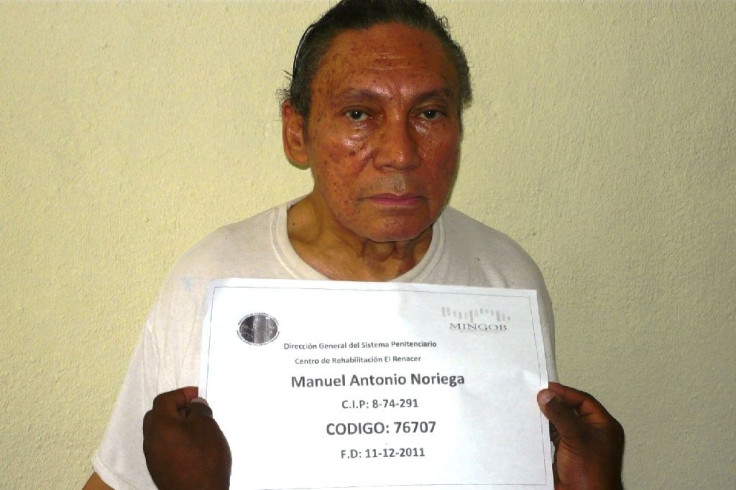Manuel Noriega Cause Of Death: Former Panamanian Dictator Dies At 83

A convicted drug trafficker and Panama’s former military leader, Manuel Noriega, died Monday in Panama City due to failing health, according to reports. He was 83.
Noriega was in a medically induced coma state ever since he suffered brain hemorrhage in March. The hemorrhage was caused shortly after a surgery was performed on Noriega to remove a benign tumor from his brain. A court had placed him on house arrest in late January so he could undergo the surgery. In recent years, he reportedly suffered from a range of health problems including blood pressure, bronchitis, prostate cancer, and strokes.
Read: Is Donald Trump A Dictator? John McCain Says Suppressing Media Is Now Dictators Get Started
"The death of Manuel A Noriega closes a chapter in our history; his daughters and relatives deserve a funeral in peace," Panamanian President Juan Carlos Varela tweeted in Spanish.
Noriega is survived by his wife Felicidad and daughters Lorena, Thays and Sandra.
Born Feb. 11, 1934, in Panama City, Noriega ruled the Central American nation from 1983 to 1989 and worked closely with the CIA for three decades. He was also on the agency’s payroll and orchestrated setting up of listening posts in Panama. He was also reported to be a medium for U.S. funds to Nicaraguan rebels of the leftist Sandinista government.
Noriega, who studied at a military academy in Peru, supported Gen. Omar Torrijos in a coup that ousted President Arnulfo Arias in 1968. He then rose to prominence following the death of Torrijos in a plane crash in 1981 and promoted himself to the rank of general and became de facto ruler of Panama in 1983.
The following year, Noriega backed the country’s first free presidential election in 16 years. However, upon knowing his political rival has higher chances of coming to power, Noriega influenced the election to make sure the candidate he favored was elected. During his rule, he established himself as a drug lord in partnership with the Medellin Cartel in Colombia. Some of the biggest banks in the country were used to launder drug money under Noriega’s power.
He was also known to order the execution of those who opposed him. Some members of the Panamanian military had unsuccessful coups and their leaders were consequently executed by Noriega's firing squad.
The U.S. turned its back on Noriega especially after his top political opponent was killed in 1985 and he joined hands with drug traffickers. In 1988, a Florida court charged him for helping Colombian drug traffickers smuggle cocaine into the U.S. On Dec. 20, 1989, Washington invaded Panama and ousted Noriega, following which he surrendered.
A 1988 U.S. subcommittee on terrorism, narcotics and international operations condemned the country’s relationship with Noriega.
"The saga of Panama's General Manuel Antonio Noriega represents one of the most serious foreign policy failures in the U.S. Throughout the 1970s and the 1980s Noriega was able to manipulate U.S. policy toward his country, while skillfully accumulating near-absolute power in Panama,” the subcommittee concluded at the time.
"It is clear that each US government agency which had a relationship with Noriega turned a blind eye to his corruption and drug dealing, even as he was emerging as a key player on behalf of the Medellin cartel," it added.
In 1992, Noriega was convicted in Miami for drug smuggling and racketeering. He was handed a 40-year prison sentence but was released in 2007 after serving 17 years behind bars. He was then sent to France, where he was convicted of money laundering and was sentenced to seven-year prison sentence. After this, he was transferred back to Panama and jailed for crimes committed during the time he was in power.
© Copyright IBTimes 2024. All rights reserved.






















